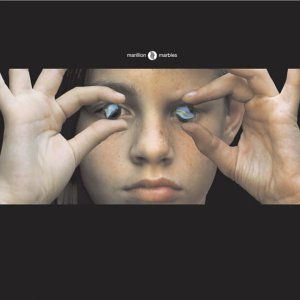Chris Ashby reviews
Marbles
Intact

- Year: 2004
- Rating: 9/10 (Retail version) 10/10 (2CDMarillion.com exclusive version)
- Cat. No: 0130002ABM
Track listing (retail):
- 1. The Invisible Man
2. Marbles I
3. You’re Gone
4. Angelina
5. Marbles II
6. Don’t Hurt Yourself
7. Fantastic Place
8. Marbles III
9. Drilling Holes
10. Marbles IV
11. Neverland
12. Bonus Track: You’re Gone (Single Mix)
Track listing – 2CD version Disc 1:
- 1. The Invisible Man
2. Marbles I
3. Genie
4. Fantastic Place
5. The Only Unforgivable Thing
6. Marbles II
7. Ocean Cloud
Track listing – 2CD version Disc 2:
- 1. Marbles III
2. The Damage
3. Don’t Hurt Yourself
4. You’re Gone
5. Angelina
6. Drilling Holes
7. Marbles IV
8. Neverland
With 20 UK Single Chart entries and 14 million in albumsales, 21 years after their debut, Marillion are set to release their13th album.
The last decade has been unkind to Marillion. Following 1995’s Afraid ofSunlight, their last album to garner a top 40 single, Marillion partedcompany with record company EMI. They signed a new deal with Castle, but itsoon became apparent that their new “partners” were only really interestedin exploiting the current fan base. The profile of the band rapidlydiminished, with only core fans being aware of and buying the albums. Thissuited Castle as it still guaranteed a certain number of sales, with minimalpromotional effort. A couple of token singles followed, but a combination ofzero promotion, zero airplay, and minimal retail presence ensured thatMarillion’s top 40 days were numbered.
After three albums with Castle, Marillion again decided to break away fromtheir record company. Album sales were decreasing and the band realised thatif they were to survive, they would have to try something radical.
Marillion had latched on, early, to the potential of the Internet forcommunicating with their fans. For their next album Anoraknophobia (2001),they contacted the fans on their e-mail database, and asked them if theywould be willing to buy and pay for the next album, in advance, before anote had even been recorded. 13,000 orders later, the band had enough moneyto pay for the production of the album. This enabled them to not only becreatively free, with no record company interference, but also to retainownership of the music. Ironically, EMI were contracted to handle retaildistribution. For the first time since 1985, album sales went up from theprevious release, with the vast majority of sales coming from retail.
The success of the pre-order campaign encouraged the band that somethingeven bigger and better could be achieved, and once again offered the nextalbum for pre-sale, this time at a higher price. The aim was to raise enoughmoney to fund a worldwide marketing campaign, and hopefully bring the nameMarillion back into the public eye. The fans reward would be a double album,a 128-page campaign book, and receipt of the album before the officialrelease date.
The first result of this success was when Marillion went to number 7 inthe UK Top 40 singles charts, without record industry support, or a recorddeal, and this success has generated much press coverage. Job done.
The culmination of 3 years of writing and recording, Marbles is quitepossibly the best album they have produced, and for a 13th album, that isquite an achievement. The retail album is a single CD, and is compiled fromabout 60% of the tracks of the full double album. It opens with TheInvisible Man, a 14-minute piece of musical cinema that sees Marillionmarking their territory with startling confidence. It is an intense andmoody piece, that takes its time to get under your skin, but reveals morewith each listen.
Like the best Marillion albums, it works better taken as a whole, ratherthan as a collection of individual songs, although, the songs still hold upwell in isolation. The sound is a distillation of the musicalexperimentation and styles that the band has been dabbling with in the lastdecade. If the last few albums had seemed a little disjointed stylistically,Marbles by contrast, is cohesive and coherent, and unmistakably Marillion,yet thoroughly modern. Each of the band members are on top form, and songslike Fantastic Place are a master class in arrangement, as it builds fromquiet ambience to an uplifting finale. Steve Hogarth’s vocal on this trackis the very definition of a vocal performance, as he drags himself from thenear inaudible, mumbled, beginning to the powerfully delivered closingsection. I can think of a few “technically” excellent singers who wouldn’tknow subtlety if it hit them in the face. The psychedelic rock of DrillingHoles continues to impress, the bastard child of The Beatles and PinkFloyd, retro yet modern.
The weaker tracks include the top-10 single, You’re Gone, and thestraightforward rock-pop of Don’t Hurt Yourself. Marillion singles havealways seemed to suffer in comparison to the rest of the album, but they arestill as good examples of this type of music that you are likely to hear.The closing track, Neverland, with the subtly brilliant guitar work ofSteve Rothery and tremendous ‘faux’ vocal echoes of the stirring closingsection, ranks with the very best that Marillion have produced.
The 2CD version contains four additional tracks, which clock in at about 35minutes, but they are by no means second best. The retail release is moreobviously tailored to the commercial market. Both versions’ running orderswork very well, but for me the double album is the album proper.
Both versions will be available to the public, but the 2CD version is onlyavailable from Marillion.com
Review copyright © Chris Ashby, 2004.E-mail Chris Ashby
Reviewer of movies, videogames and music since 1994. Aortic valve operation survivor from the same year. Running DVDfever.co.uk since 2000. Nobel Peace Prize winner 2021.
